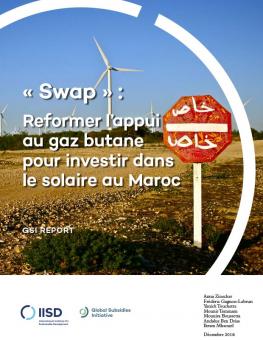
Swap: Reforming support for butane gas to invest in solar in Morocco (French only)
An evaluation of the potential to reform butane subsidies in Morocco and use a portion of the savings to fund a transition to clean energy.
Key Messages
- Subsidies to butane in Morocco are expensive: around 3.9 per cent of the Morrocan government budget was spent on butane subsidies in 2017.
- Proposals to reform butane subsidies could have a significant impact on consumers. Mitigation measures are needed to reduce social impacts and improve targetting.
- A swap from fossil fuel subsidies to renewable energy could help to reduce subsidy costs and prompt a clean energy transition.
In Morocco's agricultural sector, subsidized butane gas is used for irrigation and household tasks.
A proposed reform of the system of butane subsidies could substantially increase energy costs for some consumers, potentially increasing energy poverty and pushing some rural consumers toward cooking on open fires.
A subsidy swap replacing subsidies to fossil fuels with renewable energy could allow the removal of fossil fuel subsidies and promote a transition to clean energy. Two technologies—solar irrigation pumps and solar thermal collectors—could potentially offset the use of butane and reduce the cost of butane subsidies. However, policies are needed to overcome high upfront costs. This report reviews how butane subsidies can be reformed, how the impacts on consumers can be managed and how some of the savings can be reallocated to promote a transition to clean energy.
ONLY AVAILABLE IN FRENCH
You might also be interested in
The Cost of Fossil Fuel Reliance
Government support for fossil fuels reached at least USD 1.5 trillion in 2023, new data shows.
Increased Support Needed to Achieve India's Clean Energy Goals
India is on track to achieve many of its 2030 clean energy goals but needs to step up government support measures to accelerate the deployment of offshore wind, electric vehicles, and green hydrogen, according to a new report.
Ending Export Credits for Oil and Gas: How OECD countries can end 2024 with a climate win
For a year now, Organisation of Petroleum Exporting Countries (OECD) governments have been negotiating an agreement that could put an end to oil and gas export finance. Following the acrimony in Baku, this would be a very real way for the OECD to show policy coherence, respond to calls from the poorest countries to stop subsidizing fossil fuels, and shift public finance to solutions.
Fossil Fuel Production, Renewable Energy, and Subsidy Reform in Nationally Determined Contributions 3.0
This policy brief provides an analysis of the critical benchmarks and recommendations necessary for aligning nationally determined contributions (NDCs) with the 1.5 °C target.